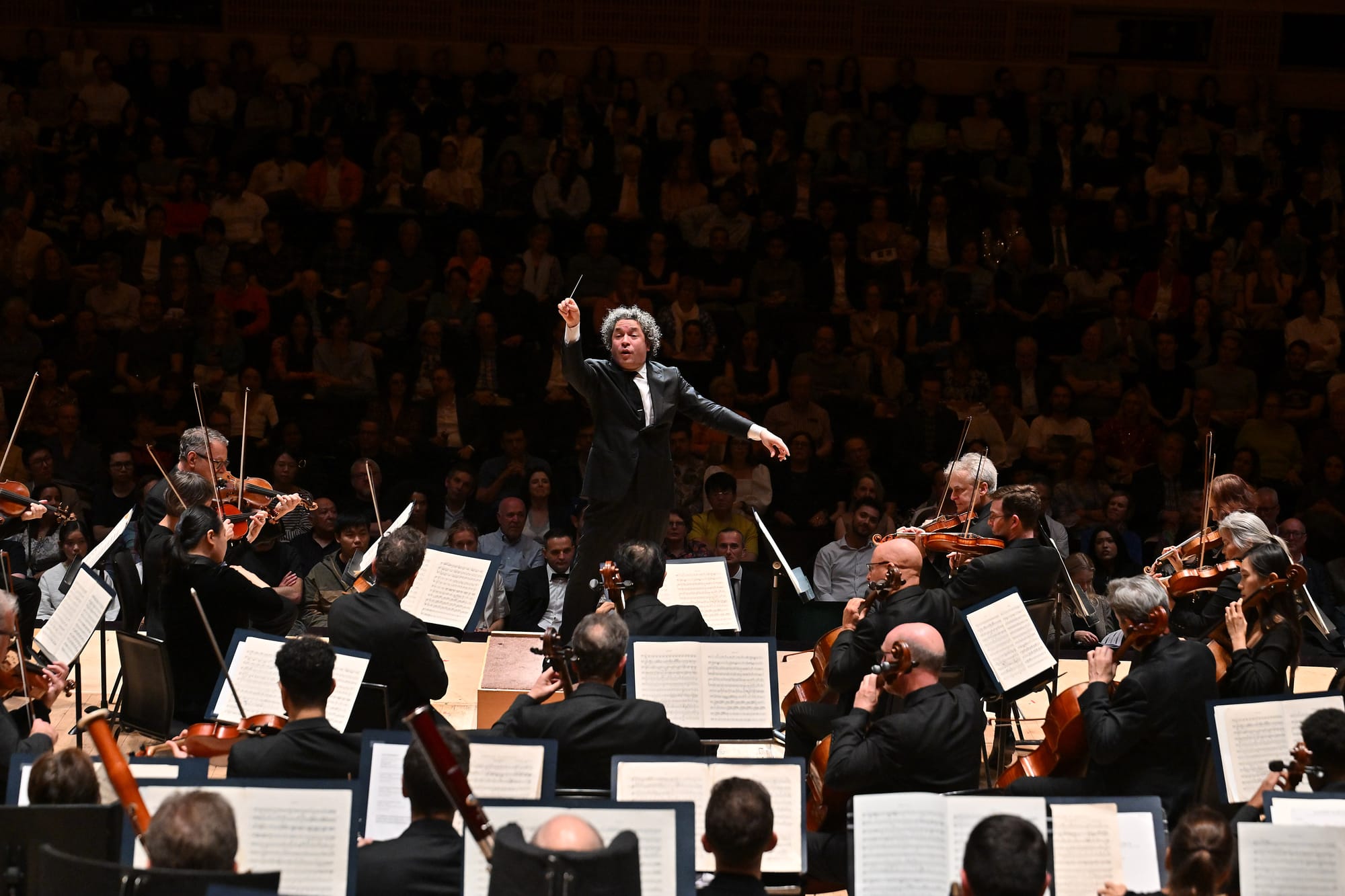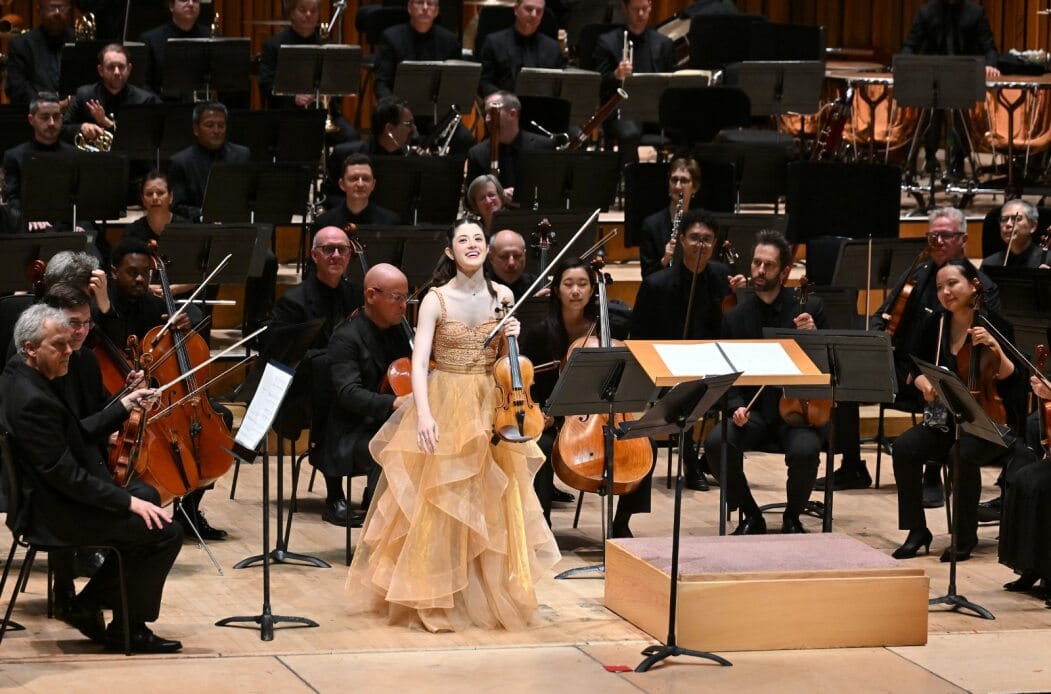
Williams, Ortiz, Dvořák María Dueñas (violin); Los Angeles Philharmonic Orchestra / Gustavo Dudamel (conductor). Barbican Hall, 02.06.2024
John WIlliams Olympic Fanfare and Theme (1984)
Gabriela Ortiz Altar de cuerda (LA Phil commission; UK premiere, 2021)
Dvořák Symphony No. 9 in E minor, ‘From the New World’ (1893)
The Los Angeles Philharmonic is always a welcome visitor to London. Here, they crown their tour with a visit to the Barbican (the previous night found them in Paris) for the first of two events: this first a meat-and-two-veg orchestral extravaganza, the second a performance of Fidelio.
The world of John Williams at once places the orchestra (Los Angeles is the home of Hollywood after all) and places us into a filmic environment. Whether or not the piece was originally intended for cinema or not: the 1984 Olympic Fanfare and Theme, commissioned by the Los Angeles Olympic Committee for the Games of the XXIII Olympiad. And how Williams fulfils his brief, what with brass as bright as can be. The Los Angeles Philharmonic has no weak sections, and this was a fine performance. There is no doubting Williams is a fine melodist, too: he has an instantly recognisable voice, as well, and he is laudably short in this piece. Not a note too many. This was a performance of exactitude: Dudamel wasted no time getting started, and from the off razor-sharp precision was the order of the day. If I am allowed a minor, minor caveat: discipline, both in performance and concert manner, is clearly important to the Los Angeles players. There is a moment when horns play ‘bells up’ towards the end, but here we had four different ideas on what bells up actually means – four bells held a different angles. A tiny point, I know.
Here’s a live performance from the Walt Disney Concert Hall by these forces:
Thus invigorated, it was to the music of Gabriela Ortiz (born 1964) and her Altar de cuerda of 2021, an LA Phil commission with support from the Lenore S and Bernard A Greenberg fund. Receving its UK premiere, Ortiz’s piece has recently been recorded by the present forces and will be available in the UK in physical format released on the Platoon label on June 7 (although I note it is already available on some streaming platforms). It is good to have the comparison, as the first orchestral entry, almost immediately after the violin begins its ruminations (so just after the violin’s anacrusis), was more together live than it is on the disc There was a sort of super-synchronicity of players in the hall that was utterly remarkable and really extended throughout the evening.
This is one of a number of pieces called Altar, starting in 1995 with Altar de néon for percussionists and chamber orchestra and working its way through a variety of names and scorings (there is one that post-dates the violin one heard here: Altar de bronce for trumpet and orchestra, composed in 2022). For the composer, an altar holds symbolic significance; the first in the series was inspired by a physical altar in a church, however. In Altar de cuarda, there are three extended movements (the first around nine, the second around 15, the finale around ten). It is not a short piece, therefore, and for all its colour and for all of Ortiz’s clear expertise in scoring for a large orchestra, it does overall feel rather too long for its materials. Ortiz has a penchant for violin cadenzas (some short, some less so), all of which played to María Dueñas’ strengths. She is a fine, almost miraculous player. Her sound is beautiful, often silken, sometimes silvery, always perfectly projected. her virtuosity sems to know no bounds, She clearly has huge resonance with the music, too, and the rapport (and ensemble) with Dudamel and his LA players was beyond criticism.
The first movement, ‘Morisco chilango’ (Chilango Moorish, where ‘chilango’ refers to Mexico City natives) is bright, with sudden Romanic swells. A horn and solo violin duet is effective, the phrases echoing: Ortiz’s scoring is ever masterful. The longest movement, ‘Canto abierto’ (Open Song) references ‘open’ chapels in 16th-century Mexican churches (intended to lure in indigenous communities inside temples). The music needs the extended space, as the basic idea is to slowly build up chords and then deconstruct them (or the other way around) so that there is almost a tidal element. An interesting addition to the scoring is wine glasses, rubbed around the rim to create an ethereal sound. Dueñas’ way with Ortiz’s long melodies was sublime. But there are passages there that are all about texture and atmospherics. In fairness, one simply reveled in the exceptional control fo both the LA players and Dueñas in a live performance, but listening again on disc confirms a rather meandering journey. The finale, though, ‘Maya déco’ is an all-round virtuoso toccata for violin and orchestra it includes a fully notated cadenza). Moto perpeuo is a vital element here. I found myself asking whether another cadenza was needed. Interestingly enough, the live performance again sounds a touch sharper than the recording. All credit to Dueñas for an exposition o super-virtuosity.
Here’s the “official” recording of the first movement:
A subsequent listening to the Altar de muertos (1997) courtesy of the recording by Cuarteto Latinamericano finds a piece of similar length that is marginally tighter compositionally speaking, but this is not a composer I shall be seeking out again quickly.
The World Premiere of Altar de cuerda ook place on May 22, 2022 at the Walt Disney Concert Hall in Los Angeles, with the present players.

Dudamel and the LA Phil have recorded Dvořák’s last three symphonies for DG, so this is familiar territory for them. This was a reading characterised by moments of real beauty (the opening, for example), power (particularly form the hard-sticked timpani – like bullets) and a stack of fine woodwind and horn solos (Andrew Bain’s final movement solo the finest I have ever heard it, the very model of control, Carolyn Hove’s cor anglais solo in the second movement beautifully phrased and supported beautifully by the strings).
But it did not add up to a coherent whole, and for that the blame lies squarely on Dudamel’s shoulders. The slow to a near-stop for the first movement second subject is the most glaring example of Dudamel’s stretching of the composer’s structural fabric to near-breaking point. Detail there was, aplenty (a second hon countermelody one rarely hears in the first movement, for example, or the perfectly balanced woodwind – and their fine staccato – in the contrasting section in the slow movement). I notice he does the same with the first movement’s second subject in his recording, where shorn of a live arena it sounds even less convincing. Certainly, there was no doubting the orchestra’s virtuosity in the Scherzo, and thematic highlighting was exceptional. But the finale was mostly just relentless. Yes, it is marked ‘con fuoco’ but fire does not have to be either careening forwards almost out of control, or relaxing into a wonderful but misguided bath of clarinet loveliness?.
As we began with John Williams, so we ended: one encore, ‘Raiders’ March’ from Raiders of the Lost Ark. Given the LAPO’s core sound is as bright as the Californian sun, it of coure suited them perfectly; but it did jar rather after the Dvořák.
Images Mark Allan / Barbican.










